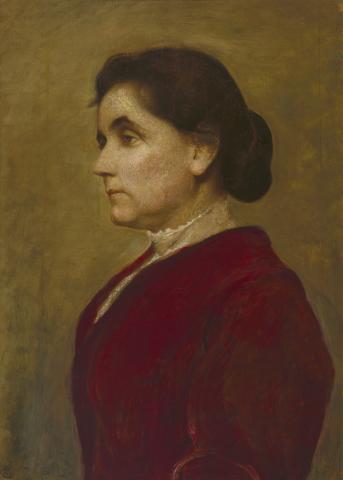
Jane Addams (1860–1935)
The social reformer Jane Addams gave her first speech against imperialism on April 30, 1899, when she declared, “For good or ill we suddenly find ourselves bound to an international situation.... Do we mean to democratize the situation?” Addams argued that the United States was responsible to help everyone flourish through democratic means and pointed out that colonialism challenged the nation’s founding ideals of liberty, democracy, and freedom. “National events determine our ideals, as much as our ideals determine national events,” she said. Addams’ pacifist efforts throughout her life culminated in her winning the Nobel Peace Prize in 1931.
This portrait of Addams was made from life in Dublin, New Hampshire, and offers psychological insight through its rendering of Addams’ dignified, serene manner and her stern expression. Addams, however, detested the portrait, calling it one of a “long line of dismal failures” of portraits made of her.
Audio Transcription: Addams gave a stirring anti-imperialist address in 1899 at an anti-imperialist rally in Chicago at their music hall. The place was absolutely packed. There were hecklers who had to be escorted out of the hall, and she stood up there and just said her piece. Addams' vision of an international community was a thoroughly democratic one in which everyone's voice counts equally. Now, this was a direct rebuttal of people like Theodore Roosevelt. His view-- he was an imperialist-- is that "It is only the warlike power of a civilized people that can give peace to the world." And he immediately followed that up by saying, "The barbarian will yield only to force." And so he thought, okay, in the continental United States we'll subdue the Native Americans, they're barbarians. And when he got to California, he says, well, it's time to keep expanding. And so he thought, let's go to the Philippines and put down the barbarians there. Well, Adams agreed with him that we're part of the international community and we have to be involved in the world. But she totally disagreed with his picture of what the international community should look like. She thought that every civilization, as she said, "grows from its own native soil." And if you stomp out people you think are barbarians, you may be stomping out what is actually the best promise for the future of this globe. And so what we need to do is come to understand foreign peoples, and participate with them as absolute equals, so that they and we can reap the benefits of our collaborations.
– I'm Marilyn Fischer. I am professor emeritus of philosophy at the University of Dayton in Dayton, Ohio.